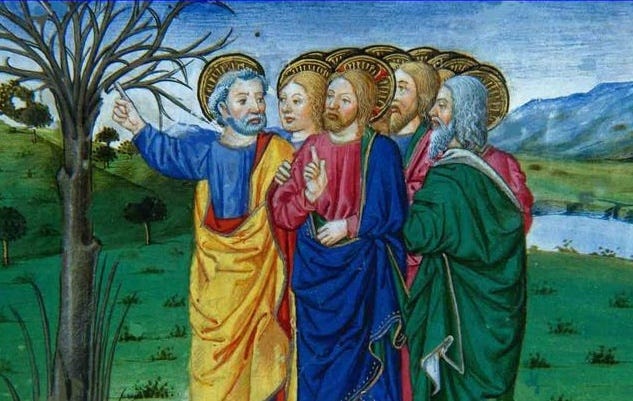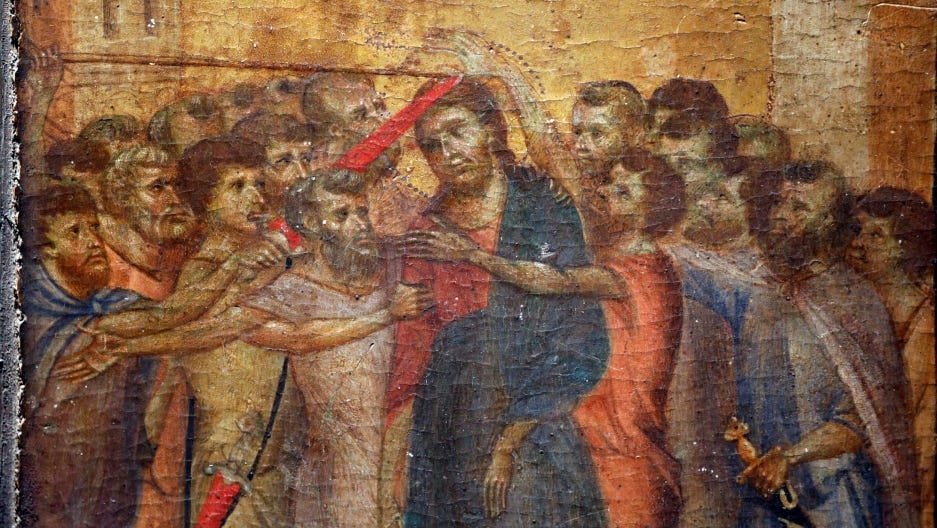A homily for the 3rd Sunday of Lent, delivered on March 23, 2025.
God is always calling us closer.
That’s what we hear in our readings today: a God who is coming to meet us, and who wants us to be ready to meet him. But God also wants us to remember that our time is short, and the end is always near.
We read in the Book of Exodus that Moses was tending the flocks, so we know he didn’t go out to meet God that day. It was just another working day. Then he saw a bush burning in the distance without being consumed, and the angel of the Lord told him this was holy ground. He needed to make himself ready to stand before the Lord by removing his sandals.
Jesus is also telling people to make themselves ready. Today’s gospel begins with the news of the day. People would have been talking about these tragedies like we talk about the latest natural disaster or school shooting.
In the first, Pontius Pilate had ordered some Galileans killed within the sacred parts of the temples, and the blood of these men had mingled with the blood of the sacrifice. This was a terrible thing, aside from the human tragedy of it, the mingling of human and animal blood was considered a grave offense to God.
Jesus is challenged to explain why tragedies like this occur, and perhaps to say something against Rome or Pilate that can be used against him. The authorities wonder what these men could have done to deserve such a horrifying, blasphemous death.
Jesus isn’t having any of it. He has already made clear to us that our suffering and pain and death are not punishments for a particular sin.
And isn’t it interesting that the same religious authorities who are horrified at the spilling of human blood by Pilate, will demand that Pilate spill the blood of Jesus. What they didn’t know was that this human blood–the blood of the messiah–would be a perfect, final sacrifice. So we have a little foreshadowing of the passion narrative in this story.
In response, Jesus brings up another headline: 18 men killed when a tower collapses. This is also a foreshadowing of something that will happen. Within 40 years of these words being spoken, Rome will tear Jerusalem down stone by stone. The temple will be destroyed. Romans will kill Jews. Towers will fall. The things we hear in today’s gospel, will happen again, only the next time it will be on a massive scale.
The people listening to Jesus were thinking that the victims of these tragedies had it coming–that suffering was a just punishment for sin. But God doesn’t go around handing out tragedy as punishment. He doesn’t say, you get cancer, you lose a child, you’re disabled, you’re poor. That’s grotesque. He permits these things, at times, sometimes to call us back to Him, and sometimes for reasons we won’t understand until we come to the end. It’s a reminder that life is fragile and brief. We are exiles on this earth, and we should never get too comfortable with it.
Instead, he tells us to stop looking at this world for answers, and start looking to the next. He wants people to repent. We tend think “the guilty” he’s talking about are someone else. We often think: we’re fine.
But unless we repent and believe the gospel, none of us will be fine, and having a building fall on us will be the least of our worries once we come before the judgment of God.
Jesus wants us to know that our time is short. The end is always near. 100% of the people alive today will die. The question is: how shall we live? Will it be in a way that’s pleasing to God, so He will judge us worthy to spend eternity with Him?
The second part of the reading is a parable that gives us an idea of what he’s looking for. God often compared the people of Israel to a fig tree that he planted and cared for, and just as often warned them, as John the Baptist did, that “Every tree that does not produce good fruit will be cut down and thrown into the fire."
Now Jesus is warning them again. How long has the tree been given to bear fruit? Three years. Three years was the length of Jesus’s ministry. He has healed and preached and worked wonders for three years, and yet so many people are still rejecting him. And now that time is drawing to a close.
There are a lot of ways to interpret this. Perhaps God the Father is the owner of the tree who comes in search of a fig, and the gardener is Jesus, asking our Father to give the people a little more time, so he can nourish the soil with his word, and water it with his blood in the hope that this tree will bear fruit that endures. And if not, He will cut it down.
The message could not be more clear: the end comes to us all, and we must be ready. That tower at Siloam stands for the fate that hangs over all of us. It could be a natural end many years from now, or a car accident on the way home. But that tower casts an awfully long shadow. All of us live in that shadow, and a tower is always falling. We must repent and turn to the Lord. We must remember that our lives are poised between two stunning mysteries: creation and destruction, beginning and end, life and death. Will we choose life, and become the tree that bears good fruit? That’s up to us.
Further homilies.
Enlarge Your Heart
A homily for the Seventh Sunday in Ordinary Time, on Luke 6:27-38, delivered over the weekend of February 22-23, 2025.



